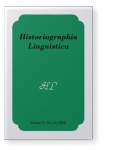Das ‘Universal Vocabulario’ Des Alfonso Fernández De Palencia (1490) und Seine Quelle
Two years before the Dictionarium ex sermone Latino in hispaniensem of the great humanist Elio Antonio de Nebrija (1441–1522), there appeared in Seville the Vniversal vocabulario en latin y en Romance collegido por el cronista Alfonso de Palentia. This dictionary is printed in two columns; the left-hand column contains a Latin-Latin lexicon, the right-hand one a Latin-Spanish lexicon. The latter is not an independent work; rather the Latin interpretations are here simply translated into Spanish. The authors of both dictionaries state expressly their intention of ‘rooting out’ the corrupt medieval Latin and providing a means of returning to a good form of classical Latin. However, a closer examination of the sources of the Vniversal vocabulario shows that it is based exclusively on a medieval lexicon of the 11th century, namely, on the Elementarium Doctrinae rudimentum of a certain Papias, about whom nothing further is known. The similarity between the two dictionaries is so great that the Vniversal vocabulario can simply be regarded as a reasonably faithful version of the Elementarium Doctrinae rudimentum. As a result, the achievement of Alfonso Fernández de Palencia is reduced to that of a mere translator.
Article language: German
References
Literaturnachweis
Briesemeister, Dietrich
1969 “
Das Sprachbewußtsein in Spanien bis zum Erscheinen der Grammatik Nebrijas (1492)”.
Iberoromania 11.35–55.


Castro, Americo
1936 Glosarios latino-espan̄oles de la Edad Media. (
= Revista de Filoloqía Española, anejo 22.) Madrid: Junta para empliación de estudios.

de Angelis, V.
ed. 1977-
Papiae Elementarium. (
= Testi e Documenti per lo Studio dell’ Antichità, LVIII.1–3.) Milano: Cisalpino Goliardica. [
I: A – AEQUUS; II: AEQUUS – ANNIFERME; III: ANNI – AZONI]

[Fernández] de Palencia, Alfonso
1966[=1490] Universal Vocabulario en latín y en Romance.
Reproducción facsimilar de la edición de Sevilla, 1490. Madrid: Comisión permanente de la Asociación de Academias de la Lengua Espan̄ola.

Gili Gaya, Samuel
1967 “
Nota preliminar [a la reimpresión de Fernandez de Palencia]”.
Fernández de Palencia,
Universal vocabulario, pp.5–6

Lapesa, Rafael
1980 Historia de la lengua espan̄ola. Prólogo de
Ramón Menéndez Pidal. Octava edición refundida y muy aumentada. (=
Biblioteca Románica Hispánica III; Manuales, 45.) Madrid: Gredos.

Lewis, Charlton T. & Charles Short
1969 A Latin Dictionary,
Founded on Andrew’s Edition of Freund’s Latin Dictionary. Revised, enlarged, and in great part rewritten. Oxford: Clarendon Press.

Nebrija, Elio Antonio de
1492 Lexicon hoc est dictionarium ex sermone latino in hispaniensem interprete aelio Antonio nebrissensi. Salmantice: s.i.

Nebrija, Elio Antonio de
1979 [= 1492] Diccionario Latino-Espan̄ol (Salamanca 1492). Estudio preliminar por
Germán Colón y
Amadeu-J. Soberanas. Barcelona: Puvill. (Ed. facs. de la ed. de 1492.)

Niederehe, Hans-Josef
1969 “
Boccaccio als Etymologe”.
Philologische Studien für Joseph M. Piel, 166–71. Heidelberg: Winter.

Niederehe, Hans-Josef
1975 Die Sprachauffassung Alfons des Weisen: Studien zur Sprach- und Wissenschaftsgeschichte. (
= Beihefte zur Zeitschrift für Romanische Philologie, 144.) Tübingen: Niemeyer.


Papias Vocabvlista. Impressum Venetiis per
Philippum de pincis Mantuanum. Anno domini MCCCCXCVI die XIX Aprilis. (Neudruck Torino: Bottega d’Erasmo
1966 [
mit einem Anhang aus der Ed. Milano: Domenico da Vespolate 1476, Heft 21
pecus – placidus].)

Cited by
Cited by 1 other publications
This list is based on CrossRef data as of 3 july 2024. Please note that it may not be complete. Sources presented here have been supplied by the respective publishers.
Any errors therein should be reported to them.
